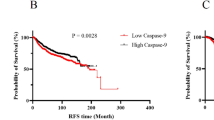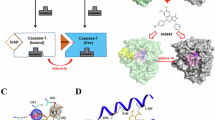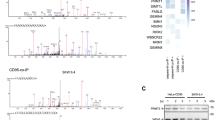Abstract
3-Deazaadenosine (DZA), a cellular methylation blocker was reported to induce the caspase-3-like activities-dependent apoptosis in U-937 cells. In this study, we analyzed the activation pathway of the caspase cascade involved in the DZA-induced apoptosis using specific inhibitors of caspases. In the U-937 cells treated with DZA, cytochrome c release from mitochondria and subsequent activation of caspase-9, -8 and -3 were observed before the induction of apoptosis. zDEVD-Fmk, a specific inhibitor of caspase-3, and zLEHD-Fmk, a specific inhibitor of caspase-9, prevented the activation of caspase-8 but neither caspase-3 nor caspase-9, indicating that caspase-8 is downstream of both caspase-3 and caspase-9, which are activated by independent pathways. zVAD-Fmk, a universal inhibitor of caspases, kept the caspase-3 from being activated but not caspase-9. Moreover, ZB4, an antagonistic Fas-antibody, exerted no effect on the activation of caspase-8 and induction of apoptosis by DZA. In addition, zVAD-Fmk and mitochondrial permeability transition pore (MPTP) inhibitors such as cyclosporin A (CsA) and bongkrekic acid (BA) did not block the release of cytochrome c from mitochondria. Taken together, these results suggest that in the DZA-induced apoptosis, caspase-8 may serve as an executioner caspase and be activated downstream of both caspase-3 and caspase-9, independently of Fas receptor-ligand interaction. And caspase-3 seems to be activated by other caspses including IETDase-like enzyme and caspse-9 seems to be activated by cytochrome c released from mitochondria without the involvement of caspases and CsA- and BA- inhibitory MPTP.
Similar content being viewed by others
Article PDF
Author information
Authors and Affiliations
Rights and permissions
This is an Open Access article distributed under the terms of the Creative Commons Attribution Non-Commercial License (http://creativecommons.org/licenses/by-nc/3.0/) which permits unrestricted non-commercial use, distribution, and reproduction in any medium, provided the original work is properly cited.
About this article
Cite this article
Chae, YJ., Kim, HS., Rhim, H. et al. Activation of caspase-8 in 3-deazaadenosine-induced apoptosis of U-937 cells occurs downstream of caspase-3 and caspase-9 without Fas receptor-ligand interaction. Exp Mol Med 33, 284–292 (2001). https://doi.org/10.1038/emm.2001.46
Published:
Issue date:
DOI: https://doi.org/10.1038/emm.2001.46
Keywords
This article is cited by
-
Caspase-dependent apoptosis induced by two synthetic halogenated flavanones, 3′,7-dichloroflavanone and 3′,6-dichloroflavanone, on human breast and prostate cancer cells
In Vitro Cellular & Developmental Biology - Animal (2018)
-
Raloxifene, a selective estrogen receptor modulator, induces mitochondria-mediated apoptosis in human endometrial carcinoma cells
Medical Molecular Morphology (2008)
-
Overexpression of human 27 kDa heat shock protein in laryngeal cancer cells confers chemoresistance associated with cell growth delay
Journal of Cancer Research and Clinical Oncology (2006)



